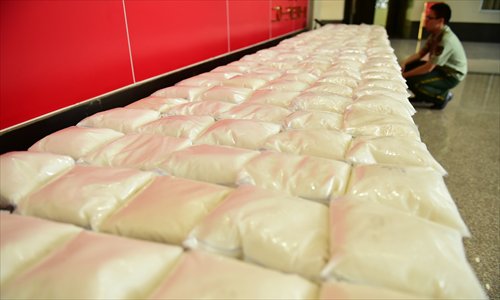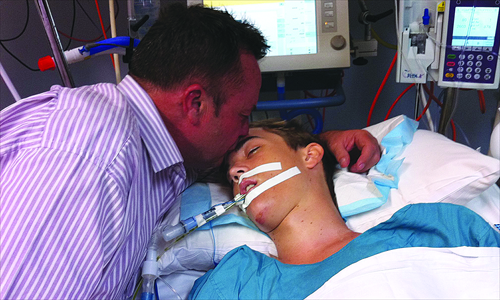Grieving Australian father prompts China to address deadly synthetic drug exports
An Australian father has demonstrated China serves as a global supermarket for the kind of synthetic drugs that killed his son, stirring an international outcry. UN member states, including China, are rushing to place these new psychoactive substances onto their lists of controlled substances. Abuse of these synthetic drugs hasn't become widespread in China, but the country has already built an early warning mechanism and will not relent on cracking down on their illegal manufacture and sale, experts say.

Confiscated drugs on display in Dongguan, Guangdong Province, in June Photo: CFP

Rodney Bridge and his son Preston Bridge Photo: Courtesy of Rodney Bridge
A grieving Australian father has spearheaded the investigation of two chemical manufacturers in China, helping produce an undercover news investigation that has brought a global spotlight to the country's production of synthetic drugs.
In February 2012, 16-year-old Preston Bridge died after falling off a balcony after he took 25I-NBOMe, a synthetic hallucinogen which can lead to significant toxicity and psychosis.
While mourning the loss of his son, Rodney Bridge decided to do something to prevent similar tragedies. In 2014, he and two friends formed Sideffect, a nongovernmental organization which is dedicated to raising awareness of the fatal danger of taking synthetic drugs.
This August, Bridge posed as a buyer and made a trip to Hefei, Anhui Province, in East China, the country which he knew from the police was the origin of the drug Preston took and a major source of synthetic drugs associated with several deaths in Australia.
"Several deaths have happened in Australia from 25I-NBOMe made from China. There has been eight that have been identified," Bridge told the Global Times via Facebook in late September.
Wearing glasses with a hidden camera and carrying a listening device hidden in a pen, he had a face-to-face meeting with dealers from two chemical manufacturers in Hefei, together with an Australian reporter working for the American news show 60 Minutes. On September 13, the story was aired, drawing worldwide attention.
Rush to action
Many Chinese media organizations reported on or linked to the news. Many Chinese praised the father for his courage, and some said Chinese should feel ashamed.
During the investigation, Bridge found young dealers selling designer drugs such as alpha-PVP, 4-CMC and 25I-NBOMe. He said he was shocked that the dealers promised safe delivery to Australia via international logistics firms, but never asked about how the drugs would be used.
Police in Anhui told media that they noticed the news on September 14 and started an investigation immediately. But since 25I-NBOMe was not on the national controlled drug list, drug police have no right to intervene, the police said.
China lists 121 narcotic drugs and 81 psychotropic drugs as controlled, but neither 25I-NBOMe nor 4-CMC were on the list.
Chinese regulations say that any individuals or units shall not research, produce, sell, use, store or deliver controlled drugs, unless designated by the State drug administration for medical, research or educational purposes.
In response to an interview inquiry from the Global Times about the investigation, the publicity department of Anhui Public Security said they had nothing new to say.
Hefei Chitai Biochemical Tech Co, one of the two companies Bridge visited, mainly engages in the production and sale of chemical raw materials and reagents, according to its industrial and commercial registration information.
The company erased all products and contact information from its website, after Bridge's investigation was broadcast.
The other company Bridge visited, Oster Biological Technology Co, still peddles as many as 54 types of chemicals on its English website, including alpha-PVP, 25I-NBOMe, and even methylone, which is on China's controlled drug list. The company can supply 100 kilograms per month of each product, it said.
The company website indicates "research purposes" under the sales information section of each product, but it promised that it will "reship" the same amount of product for free if a package gets seized by customs, and they can synthesize any kind of product the client wants.
"I will lobby the Australian government to speak to the Chinese government about stopping the manufacture of these products," Bridge told the Global Times, describing his next move.
Australia announced a blanket ban on all synthetic drug imports in early September, but these substances are reportedly very difficult for sniffer dogs to detect.
Before making the decision to go to China, Bridge collected information concerning the synthetic drug trade between the two nations and handed it to Australian police, but in vain. He hoped his trip to China would push the authorities to take further action.
Bridge said that following the broadcast of the news segment, he has received much support from the public worldwide, but he has not heard from any official from China or Australia so far.
Legal vacuum
People have criticized Chinese police for inaction, but there's no legal basis for them to make an arrest. Designer drugs, which mimic the effects of illegal drugs but have novel chemical structures, could pose serious risks to public health and safety. A class of drugs referred to as new psychoactive substances, or NPS, has seen a rapid emergence across the world in recent years. Some of the drugs are sold openly in shops or ordered online and delivered by mail services, according to the United Nations Office on Drugs and Crime (UNODC).
According to media reports, self-mutilation, violent attacks or suicides associated with taking these drugs has happened in many countries, including the US, UK and Japan.
Justice Tettey, the chief of the UNODC Laboratory and Scientific Section, told the Global Times that 96 countries and territories had reported over 540 NPS to the UNODC by July 2015, and the office is trying to put them under control step by step.
"The office continues to work with all member states, including China, and relevant international organizations to address the NPS phenomenon, and these efforts include identifying the most prevalent, most persistent and most dangerous of the potentially harmful NPS, that require action at the international level," Tettey said in an e-mail.
According to a recent UNODC press release, the Commission of Narcotic Drugs decided in March 2015 to place 10 NPS, including 25I-NBOMe, under international control.
The decision shall become fully effective with respect to each party on November 5 according to the 1971 Convention on Psychotropic Substances, Tettey said.
Chinese authorities have also noticed the problem. "Some people in the country grasp the legislation gap and produce NPS in large amounts," the Narcotics Department of the Ministry of Public Security noted in a report released in June.
The latest official figures show that the registered number of synthetic recreational drug users in China has surpassed the number of users of traditional recreational drugs, reaching 1.46 million by the end of 2014, a 36 percent rise over the previous year.
Li Wenjun, a drug expert from People's Public Security University of China, told the Beijing News that it takes time to place a substance under control. The process needs joint efforts by health, drug and public security officials to monitor and investigate problems and evaluate solutions.
Shi Jianchun, deputy director of the Beijing Anti-Drug Education Center, said that to bypass the law, some drug dealers tried to revise the molecular structure of their products. "In China, I have heard of cases of youth taking NPS like bath salts and 25I-NBOMe," he told the Global Times.
Nevertheless, there's no publicly known deaths associated with these substances in China.
Liu Zhimin, deputy director of the National Institute on Drug Dependence, Peking University, said Chinese authorities have attached increasing concern to new synthetic drugs in recent years.
"According to the center's 31 monitoring stations across the country, we haven't discovered abuse of NPS in society. Nonetheless, the country has built an early warning system for the substances," Liu told the Global Times, noting that NPS can be addictive and very dangerous.
The international community hasn't found an effective way to treat addiction yet, and lacks clinical experience to treat the physical and psychological complications, he said.
Drug supermarket
On guidechem.com, a large English website for chemical products, based in Zhejiang Province, there are 49 suppliers selling 25I-NBOMe, including 41 from China.
Global Times tried to reach five suppliers via Skype, but only one replied. The supplier Hubei Ali_yun BioChemical Co asked the Global Times reporter, who was posing as a buyer, to "wait a moment" to buy the 25I-NBOMe, because the company was under pressure due the wide coverage of Bridge's story. When the reporter inquired with further questions, the supplier suddenly unfriended the reporter and went off-line.
Among calls to six other suppliers, only two got through. Hutong Global in Tianjin replied that they had not produced the product for a long time.
Top Chemical, a chemical trading company based in Guangdong, also gave a similar reply. But guidechem.com shows that it has just updated the product information on September 22.
"China had to be exposed for the manufacturing of these lethal research chemicals that they sell as medical research products," Bridge explained on his Facebook account after his mission to China.
Based on his research, he believed that China is a major sources for ingredients or finished products of the synthetic drugs.
China has become the world's largest maker of chemical products and some foreign media accuse it of being the primary source for new synthetic drugs.
Such criticisms are irresponsible, Liu Zhimin said. "China is very strict in its control of narcotic, psychoactive and precursor chemicals and has been active in taking preventive measures to crackdown on drug manufacturing, trade and abuse," Liu said, pointing out that the country has placed several drugs which are not in the global convention framework under control, such as ketamine and khat.
Following anti-drug remarks by Chinese President Xi Jinping and Premier Li Keqiang, the country launched a six-month campaign against recreational drug use in 108 cities in September 2014. A total of 115,000 cases were opened, 133,000 suspects were detained and 43 tons of drugs were seized.
"But this doesn't rule out some manufactures in China making new synthetic drugs illegally," Liu said.
In 2013, Shanghai police arrested Zhang Lei, owner of China Enriching Chemistry, after he was accused of manufacturing thousands of pounds of synthetic drugs for buyers in 57 countries, according to the New York Times.
"My mission is to save lives and not allow other families to suffer what we do each and every day. These drugs are killer drugs and must be stopped," Bridge said.
He has considered returning to China. "China is a very big country and it will be an extreme challenge to stop it. Education is the only way. I would love to return to China but I am not sure if I would be welcome," he said.
Yuan Lipin contributed to this story
Newspaper headline: Pushing back